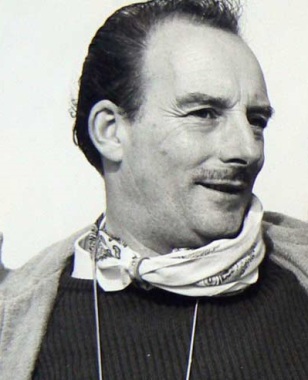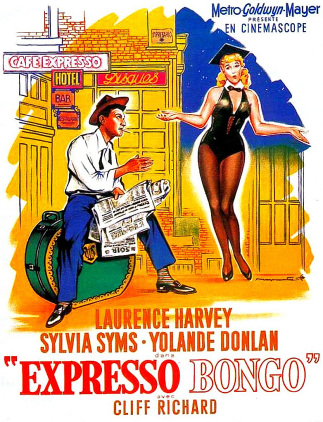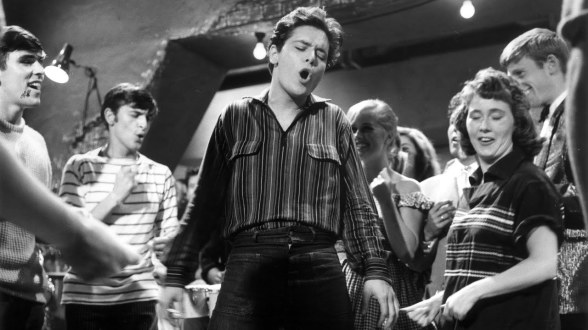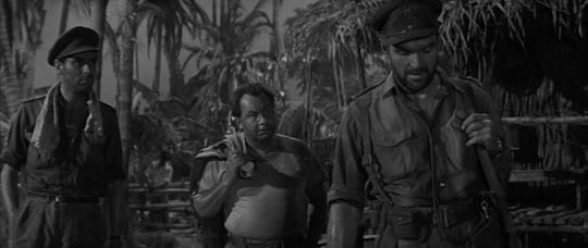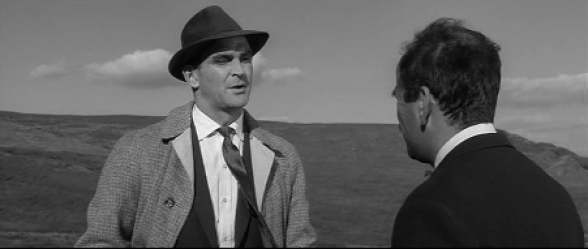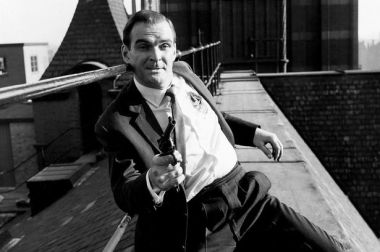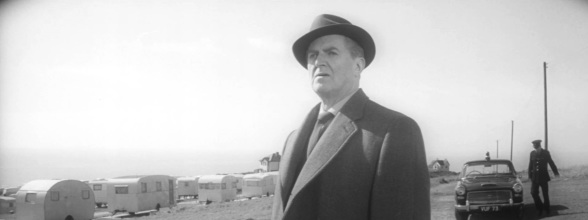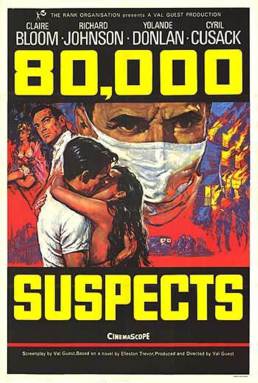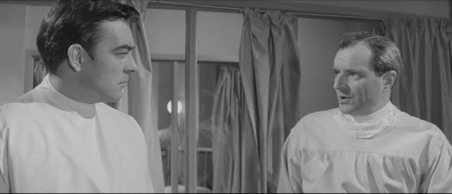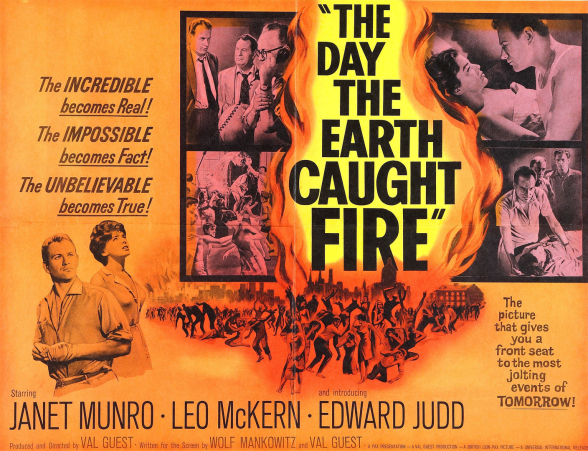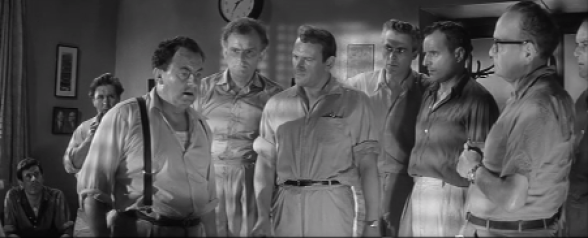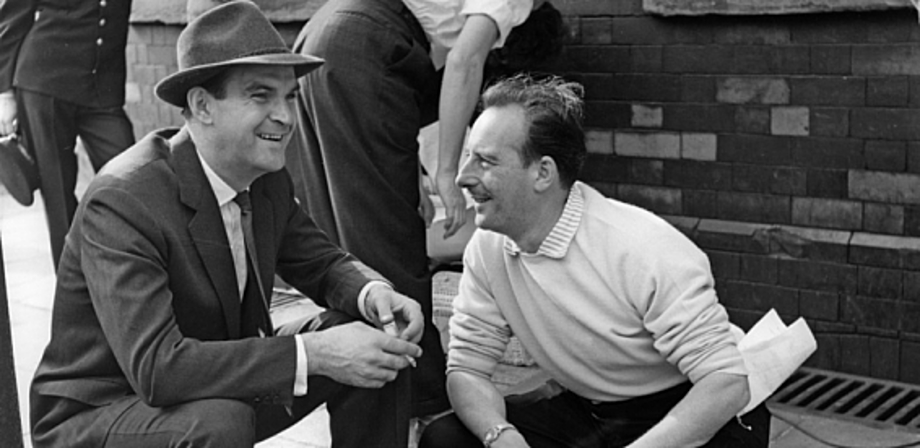
VAL GUEST
Val (short for Valmont, I thought for many years that Val Guest was a woman) Guest had a long and somewhat uneven career in film and TV; born in 1911 in London, he worked for a time as a film journalist for the Hollywood Reporter, doing some acting here and there, but really got started in the film business in the 1930s, where he was a scriptwriter at Gainsborough Studios, getting a writing credit with people such as Marriott Edgar on Will Hay comedies, including Ask a Policeman and Oh Mr Porter! The story of how he managed this sounds unlikely but may be true; apparently one of his reviews of a Marcel Varnel film so infuriatted the latter that he challenged Guest to write a screenplay to see if he could do any better, and so he did.
He started directing as well in the mid 1940s, but things started to pick up for Guest after his wife, Yolande Donlan, an American actress whom he married in 1954, persuaded him to take on the job of directing a Quatarmass film (Guest apparently didn't like science fiction and wasn't going to accept). The films (the Quatarmass Xperiment was followed by Quatarmass 2) repeated the success of the TV series, and launched Guest on a number of films over the next 10 years or so which deserve looking at in more detail
Expresso Bongo (1959)
I always thought that Expresso Bongo was a dreadful showcase for beat combos of the time - a sort of 'Keep your hair on Daddio' with unintentional laughs - but it's actually a satire on the music/variety business, although by all accounts the satire is toned down from the original stage musical. Laurence Harvey - with his accent shifting all over the place as his mood takes him - plays Johnny Jackson, every two-bit hustler/loser/wide boy rolled into one, a sort of Harry Fabian for the beat generation, who is on the lookout for the 'next big thing', whilst ignoring his girlfriend Maisie (Syliva Syms, an unusual role for her) who is trying to get noticed as a singer whilst dancing as a stripper in a run down seedy club. Johnny then stumbles on Bert Rudge (played by Cliff Richard - the name is not too far removed from Richard's real name of Harry Webb) in an expresso bar, who wants to play the bongos but in fact has a good singing voice and so Johnny moves in quick, renames him Bongo Herbert, generously offers him a 50/50 deal, and sits back to let the money roll in. Here's the scene where Johnny gets himself onto TV to sell his product:
Bongo is pushed by Johnny into appearing alongside an ageing American star, Dixie Collins (Guest's wife, Yolande Donlan, who features in a number of his films), but this backfires on him as she takes him under her wing and soon manages to expose Johnny's exploitative contract with Bongo. As the latter goes from success to success, Johnny inevitably ends up back where he started but, never one to feel self-pity, he dusts himself down and seeks another opportunity.
It may have been hard edged at the time, but the film has not aged well and the acting is variable to say the least; Guest seems unsure whether to play it for laughs or go for satire and ends up inbetween, whilst it's hard to tell if Richard is acting at all, and Syms has nowhere near enough to do apart from be endlessly exasperated wtih Johnny, indeed only Donlan really emerges with any credit as the all-too-human Dixie, painfully aware that what goes around comes around and that her star is on the wane.
Yesterday's Enemy (1959)
Yesterday's Enemy (1959) is a powerful and thoughtful film set in Burma in 1942, starring Stanley Baker, Gordon Jackson, Guy Rolfe, Leo McKern and Philp Ahn (he of 'Master Kan' fame from 'Kung Fu') which tells the story of a British unit, retreating from the Japanese and cut off from their headquarters, who come across a small village where an ambush awaits them. Led by Captain Langford (Baker), due to the Brigadier being badly injured, they manage to kill all the Japanese whilst sustaining their own losses; they then find out that a Japanese colonel is amongst the dead, and that he was in possession of a map with markings that Langford can't decipher, although he instinctively knows that the information is of vital importance.
However the unit capture a Burmese informer (Wolfe Morris) as he tries to escape from the village, and through highly illegal means force him to reveal the information, during which Langford shows a completely ruthless and driven personality which is very much at odds with the usual depiction of British officers during WWII, and which leads him into conflict with the Padre (Rolfe) and a journalist (McKern), as can be seen in this clip:
Langford continues to focus on trying to save the men under his command, ignoring all advice, although the tables are turned when the unit is in turn captured by the Japanese, led by Major Yamazaki (Ahn), who is every bit as ruthless as Langford. Both men seem to recognise themselves in the other, and by the end of the film - which ends unexpectedly in some ways, again entirely at odds with the usual war film ending of the period - it is very hard for the audience to know what is 'right' any more.
There are many other 'name' actors in the film - Bryan Forbes, David Lodge, Richard Pasco, even Burt Kwouk if you don't blink - but the film is dominated by Baker, in one of his best roles and indeed performances, and it is, perhaps unsurprisingly, one of Guest's favourite films of his own.
Hell is a City (1960)
Guest worked with Baker again in Hell is a City, a crime story that was one of the films that began to look in a more problematic way at the life of a detective. Jack Hawkins' wife in The Long Arm a few years before was long-suffering due to her husband's long hours, but there was never any sense that the marriage was under threat in any way; in Hell is a City Baker's character, Inspector Martineau, is constantly on edge with his wife (Maxine Audley) and there is no real suggestion that the marriage will work out. This insight into Martineau's private life is perhaps the best part of the film, as it has always seemed a very overrated film to me, as, despite Baker being excellent as always, the main narraitve - that Martineau and the man on the run, Starling (John Crawford) are really two of the same and only Martineau really knows what Starling is thinking never takes off, partly as the theme seems underwritten but mainly as Crawford is woefully miscast, and the idea that Martineau and Starling (with his American accent) grew up together is risible.
Some of the most memorable scenes take place on the moors, including this one which only has a tenuous link to the main story but is memorable for its setting and for the depiction of a game which I do not profess to understand the rules of, nor am I sure why the police have to devote half of their resources to in order to stop it:
Martineau is one of the first of a new breed of police officer, willing to bend the rules but only to get the right result - he says to one suspect "I've walloped you when you've been a rough boy, but I've never laid a hand on you to make you admit anything." This kind of thinking led to the likes of Inspector Regan in the 70s, but at the time Hell is a City was a key film in transforming the image of the police officer (Dixon of Dock Green aside), and Hell is a City ends with Martineau, alone and adrfit, in the big city.
Jigsaw (1962)
Guest returned to the crime film in 1962 with the Brighton-set Jigsaw, a murder mystery/police procedural starring Jack Warner as Det Insp Fred Fellows. The problem is, Warner was far too old (he was 66 when filming took place) to play a police officer - it is hard to credit that he was to go on and play PC Dixon for more than another 10 years - and he is positively creaking as he goes about his sleuthing. After a letting agent, Restlin (Brian Oulton) complains about a lack of perceived action following a break in at his offices, Fellows and his sidekick Sgt Wilks (Ronald Lewis) find that they've stumbled on to something rather nasty:
In contrast to Hell is a City, we see nothing of Fellows' private life - his only complaint relating to his workload is that the murder means he has to miss a big cup tie that he has a ticket for - and in some ways the film is a return to The Long Arm or Gideon's Day, with Yolande Donlan featuring again, as well as Michael Goodliffe as one of the suspects. Until quite recently, Jigsaw was little-seen but it was released by Renown on DVD a couple of years back although the print is of remarkably poor quality for some reason.
Although Guest wrote, directed and produced The Beauty Jungle in 1964, one of the 'affluent society' films prevalent at the time, I have written about this film at length in the 'Unsung films' section on this website, so here I'll just briefly mention a couple of 'panic' films made by Guest, 80,000 Suspects and The Day the Earth Caught Fire, which have superficial similarities.
80,000 Suspects (1963)
After Manchester and Brighton, it was the turn of Bath to provide the background to this story of a smallpox outbreak which the authorities and medical services try to contain before it spreads. Richard Johnson and Claire Bloom are a married couple (Steven and Julie Monks) whose marriage, did they but realise it, is on the rocks as they have slowly drifted apart from each other. At a New Year's Eve party Julie ends up taking a very drunk friend, Ruth Preston (Donlan again) back home to sober up whilst her husband Clifford (Michael Goodliffe) works the night shift at the hospital (he and Steven are doctors, Julie an ex-nurse). Calling in at the hospial before he leaves the next day on holiday, Monks is asked by Clifford to look at a patient whose symptoms are worrying him, and Monks suspects that the woman has smallpox, caught from her son who, as a steward on a ship, has brought it back from the Far East.
Monks still hopes to get away, but Julie decides to stay and help as the good people of Bath try to contain the outbreak before it becomes an epidemic. In this scene all measures are taken in a desperate struggle against the odds:
Julie, rather inevitably, gets the virus herself, whilst Clifford worries about the whereabouts of Julie, although he knows that she is unfaithful to him and that their marriage is little more than a sham. Cyril Cusack plays a priest who comforts Julie and offers words of wisdom to Steven, although these dialogue scenes only tend to slow the action down, and there is never any sense that the virus will spread too far, in fact the last half an hour or so of the film focuses on the hunt for Rita, as the truth emerges about Steven's previous relationship with her (which the audience suspected anyway). The film therefore tends to lack tension and drama as a result, but this is still one of those hard-to-categorise films of the early 60s which have largely been forgotten about and its recent (2016) DVD release is overdue but very welcome.
The Day the Earth Caught Fire (1961)
In the same month that The Day the Earth Caught Fire (hereafter TDTECF) was released - Nov 1961 - there was an excellent episode of The Twilight Zone, written By Rod Serling himself, where the earth has changed its orbit and is heading towards the sun (although as usual with The Twilight Zone there is a twist ending). Guest and his writing partner Wolf Mankowitz seem to have had the same idea as Serling, although in this film mankind has brought about its own doom.
The film opens in London, suffused with an orange-tinged glow, as Peter Stenning (Edward Judd) wanders the deserted streets and then files a report on what appears to be the end of the world. The rest of the film, other than its ending, then takes place in a flashback starting three months previously; Stenning, a cariacture of a hard-bitten newspaper reporter (heavy drinker, divorced, rarely gets his copy in on time) works for the Daily Express, where Bill McGuire (Leo McKern) and others start noticing a number of meterological oddities, such as solar eclipses occurring 10 days before they were expected, although McGuire is more concerned about a recent nuclear test and its implications. Stenning starts a relationship with Jeannie Craig (Janet Munro) who works at the Meterological Office, but he still finds it hard to seperate his personal and professional lives as he gains access to key information:
We follow the story through the eyes of the Daily Express staff, particularly its editor Arthur Christiansen (who really was the Daily Express editor, here playing himself, as well as being a technical adviser on the film), and its quite fun as usual to spot certain faces (some uncredited) amongst them, such as John Barron and Peter Butterworth (see below).
As the temperature rises, and water starts being rationed, the thin veener of civilisation soon evaporates and authority starts breaking down, with gangs of 'beatniks', as they were termed then, determined to throw caution to the wind and hold water parties, with Stenning haveing to rescue Jeannie from one such group. The solution proposed is to detonate four nuclear bombs simultaneously, to try and jolt the earth back to its normal course, and so we return to the present day, with only about 15 minutes before they are due to go off. The ending is left to one's imagination, as exemplified by the famous 'Earth Doomed' and 'Earth Saved' alternative headlines, ready to go to print depending on the outcome. The theme of tampering with the natural world was very apposite at the time, but the film remains relevant in an era of climate change and deserves its cult status.
I should just mention Arthur Grant, a cinematographer for Hammer, whose crisp photography on location impressed on three of Guest's films, Hell is a City, 80.000 Suspects and Jigsaw, and although Guest himself ended up making tawdry rubbish like Au Pair Girls in the 1970s, his work over a 10 year period (1955 to 1965 approximately), and the range of subject matter he covered, is still noteworthy more than 50 years later.
The pic at the top shows Val Guest (right) with Stanley Baker during the makng of Hell is a City
